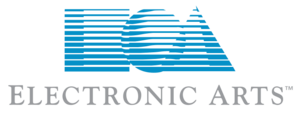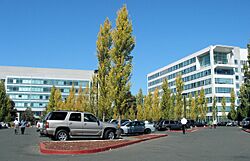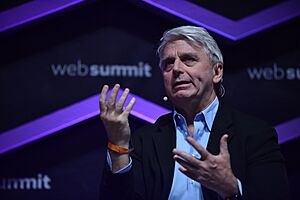Electronic Arts facts for kids
 |
|
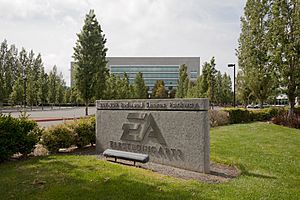
The EA headquarters building in Redwood City, California, in May 2011
|
|
| Public | |
| Traded as |
|
| Industry | Video games |
| Founded | May 27, 1982 in San Mateo, California, US |
| Founder | Trip Hawkins |
| Headquarters |
,
US
|
|
Area served
|
Worldwide |
|
Key people
|
|
| Products | See list of Electronic Arts games |
| Revenue | |
|
Operating income
|
|
| Total assets | |
| Total equity | |
|
Number of employees
|
c. 14,500 (2025) |
| Divisions |
|
| Subsidiaries | See § Company structure |
| Footnotes / references Financials as of March 31, 2025[update]. |
|
Have you ever played The Sims, Apex Legends, or EA Sports FC? These games, and many more, are made by Electronic Arts Inc. (usually called EA). EA is a major American video game company based in Redwood City, California. It was started in May 1982 by Trip Hawkins, who used to work at Apple.
In the beginning, EA was known for making games for home computers. They treated their game designers like "software artists" and gave them credit for their work, which was unusual at the time. Over the years, EA grew by creating its own games and by teaming up with other game studios.
Today, EA is famous for huge game series like Battlefield, Need for Speed, and The Sims. They also have a special division called EA Sports that makes popular sports games like EA Sports FC (formerly FIFA), Madden NFL, and NHL. You can buy and play their PC games on their own online platform, the EA App.
On September 29, 2025, EA announced that it had agreed to a $55 billion deal to become a private company. This means it would no longer be owned by public stockholders. The deal was made with a group of investors, including Saudi Arabia's Public Investment Fund. The change is expected to be finalized by June 2026.
History
1982–1991: The Beginning of EA
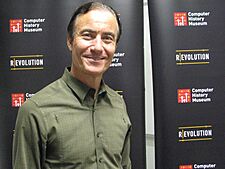
Trip Hawkins started Electronic Arts in 1982 after working at Apple. He believed that making video games was a form of art. He wanted the people who created the games, the programmers and designers, to be famous like movie stars or musicians.
The company's name was decided at a meeting. Some people wanted to call it "Electronic Artists," but others thought "Electronic Arts" sounded better because the developers were the artists. In the end, everyone agreed on Electronic Arts.
In its early days, EA did things differently. They sold their games in square boxes that looked like record albums. They also put photos of the game developers in magazine ads, calling them "software artists." This made EA a cool and popular place for game creators to work.
EA's first games were for home computers like the Apple II and the Amiga. In 1987, EA released Skate or Die!, its first game made by its own in-house team. The company also started making yearly sports games, like the popular Madden NFL series, which began after they signed a deal with football coach John Madden.
1991–2007: Growing Bigger with Consoles
In 1991, Larry Probst became the new CEO. During this time, EA started making more games for consoles like the Nintendo Entertainment System and the PlayStation. This was a big change from only making computer games.
The company grew quickly by buying other successful game studios. In 1997, EA bought Maxis, the studio that created The Sims, which became one of the best-selling PC games of all time.
EA also became the top publisher for sports games. They made deals with major sports leagues like the NFL and organizations like ESPN to be the only company allowed to make official games for them. This led to hit series like FIFA Soccer, NBA Live, and NHL.
2007–2013: A New Online World
John Riccitiello became CEO in 2007 and reorganized the company. He wanted to give individual studios like BioWare and Maxis more freedom to be creative. This was called the "city-state" model.
During this time, EA focused more on digital games. In 2011, EA launched Origin (now called the EA App), an online store for PC games to compete with services like Steam. This allowed players to download games directly instead of buying them in a box.
The company also expanded into mobile games by buying studios like PopCap Games, the creators of Plants vs. Zombies and Bejeweled.
2013–2022: Star Wars, New Games, and Big Changes
Andrew Wilson became the CEO in 2013. One of the biggest events of this period was when EA made a deal with Disney to be the main creator of Star Wars video games. This led to popular titles like Star Wars Battlefront and Star Wars Jedi: Fallen Order.
However, the release of Star Wars Battlefront II in 2017 caused some problems. Many players were unhappy with the game's use of "loot boxes," where players could pay real money for a random chance to get powerful items. After listening to the complaints, EA changed how the system worked.
In 2019, EA had a huge surprise hit with the free-to-play game Apex Legends, developed by Respawn Entertainment. The game became incredibly popular very quickly. EA also continued to grow by buying more studios, including Codemasters, known for its racing games.
2023–Present: Restructuring for the Future
In 2023, EA announced a big change in its structure. The company was split into two main parts: EA Entertainment, which focuses on games like Apex Legends and The Sims, and EA Sports, which handles all the sports titles.
Like many large companies, EA has also made changes to its teams to focus on its biggest and most successful games. This meant that some jobs were cut, and development on some new games was stopped so the company could put more effort into its well-known series.
Company Structure
EA is organized into two main divisions, with many game studios working under them. Here are some of the most famous ones.
EA Entertainment
This division creates many of EA's most popular action, adventure, and simulation games.
- BioWare: Known for creating deep story-driven games like the Mass Effect and Dragon Age series.
- Criterion Games: The studio behind many of the Need for Speed games.
- DICE: The creators of the popular Battlefield series.
- Maxis: The studio that makes The Sims.
- Motive Studio: Has worked on Star Wars games and the remake of Dead Space.
- PopCap Games: Famous for casual games like Plants vs. Zombies.
- Respawn Entertainment: The creators of Apex Legends and Star Wars Jedi: Fallen Order.
EA Sports
This division is dedicated to making realistic sports video games.
- Codemasters: A studio famous for its racing games, including the official Formula 1 series.
- EA Orlando: The main studio for the Madden NFL series.
- EA Vancouver: The studio that develops the FC and NHL series.
Partnership Programs
Besides making its own games, EA also helps other developers publish their creations.
EA Partners
The EA Partners program helps independent game studios bring their games to a wider audience. EA helps with publishing and distribution, so smaller studios can focus on making the game. Some famous games published through this program include the Crysis series and Brütal Legend.
EA Originals
EA Originals is a special program that helps fund and support unique and creative games from small, independent studios. Under this program, the smaller studio keeps the creative control and ownership of their game. Once EA makes back the money it invested, all future profits go directly to the developers.
Some popular games released under the EA Originals label include:
- Unravel and Unravel Two
- A Way Out
- It Takes Two
- Wild Hearts
| Year | Title | Developer | Platform(s) |
|---|---|---|---|
| 2016 | Unravel | Coldwood Interactive | Microsoft Windows, PlayStation 4, Xbox One |
| 2018 | Fe | Zoink | Microsoft Windows, Nintendo Switch, PlayStation 4, Xbox One |
| A Way Out | Hazelight Studios | Microsoft Windows, PlayStation 4, Xbox One | |
| 2019 | Unravel Two | Coldwood Interactive | Microsoft Windows, Nintendo Switch, PlayStation 4, Xbox One |
| Sea of Solitude | Jo-Mei Games | ||
| 2020 | Rocket Arena | Final Strike Games | Microsoft Windows, PlayStation 4, Xbox One |
| 2021 | It Takes Two | Hazelight Studios | Microsoft Windows, PlayStation 4, PlayStation 5, Xbox One, Xbox Series X/S, Nintendo Switch |
| Knockout City | Velan Studios | Microsoft Windows, Nintendo Switch, PlayStation 4, PlayStation 5, Xbox One, Xbox Series X/S | |
| Lost in Random | Zoink | Microsoft Windows, Nintendo Switch, PlayStation 4, PlayStation 5, Xbox One, Xbox Series X/S | |
| 2023 | Wild Hearts | Omega Force | Microsoft Windows, PlayStation 5, Xbox Series X/S |
| Immortals of Aveum | Ascendant Studios | ||
| 2024 | Tales of Kenzera: Zau | Surgent Studios | Microsoft Windows, Nintendo Switch, PlayStation 5, Xbox Series X/S |
| 2025 | Split Fiction | Hazelight Studios | Microsoft Windows, PlayStation 5, Xbox Series X/S |
| TBA | RustHeart | Glowmade |
See also
 In Spanish: Electronic Arts para niños
In Spanish: Electronic Arts para niños
 | Jewel Prestage |
 | Ella Baker |
 | Fannie Lou Hamer |


